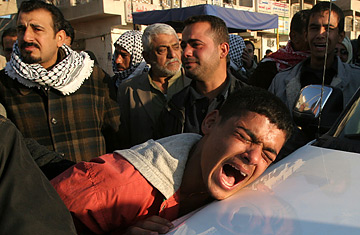
A young man mourns at a funeral for a relative killed in an attack on the Shii'te enclave Sadr City in November 2006. It is believed that Sunni arab militants were responsible for the blasts, which killed over 150 people.
(5 of 5)
It's too early to tell if the new operation will damp down sectarian tensions. "There are more ways in which this could go wrong than go right," says political analyst Tahseen al-Shekhli. "We have seen too many plans fail to have any faith in this one." Prime Minister Nouri al-Maliki, a lifelong Shi'ite partisan, has shown little patience for Sunni grievances and has failed to start an oft-promised national reconciliation process. So despite his professed conviction that the security operation is working, chances remain high that it will eventually falter, brought down by the inability of Sunnis and Shi'ites to find a political settlement or the reduction of U.S. forces that is bound to happen one day.
And then all hell would be let loose. Iraq is a country where almost every household has at least one AK-47. If there is no Sunni-Shi'ite rapprochement, a full-blown civil war would raise the daily death toll from the scores to the hundreds — to say nothing of the escalation that would come if neighboring countries became involved, Iran backing the Shi'ite militias, Arab states sponsoring the Sunnis. Such a war could continue for years, with each sectarian community splitting into smaller factions led by rival warlords. In Baghdad, the ethnic cleansing would continue to its logical conclusion, with the city split into a Shi'ite east and a Sunni west.
If it came to that, no bridge, no crossing, would convince the residents of Adhamiya and Khadamiya that they had dreams in common. Just as Muslawi and Hussein look back at the stampede over the bridge in 2005 and see different pasts, so Iraq's Sunnis and Shi'ites may now be contemplating a future that they cannot share. There could be no more bitter legacy of the Bush Administration's fateful decision to go to war in Iraq.
